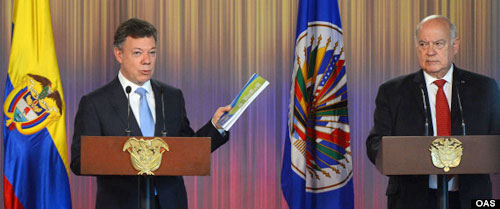|
NEW YORK The Organization of American States (OAS) on Friday, released a report laying out a future in which more countries in the Western Hemisphere legalize marijuana.
Although marijuana decriminalization and legalization was only one "scenario" outlined in the report, drug policy reform advocates praised it as a sign of an increasingly open conversation about alternatives to the war on drugs.
The OAS delivered the report to Colombia's president, Juan Manuel Santos. It commissioned the report at last year's Americas summit in Cartagena, Colombia.
Trying "alternative legal and regulatory regimes, starting with cannabis," the report found, could lead to,
Santos' country has received billions of dollars in U.S. aid meant to go toward drug eradication, but he has previously stated he is open to some form of legalization.
He is one of a growing number of Latin American leaders on record calling for a new approach to drugs.
The report, he added,
That discussion may continue in a June assembly the OAS will hold in Guatemala.
There is far from a consensus within the organization about how to handle changes to drug policy, but reformers say they are encouraged that it is no longer taboo for prominent leaders to discuss legalization.
The OAS report mentions legalization efforts in Colorado and Washington State as a potential touchstone for countries in South America, like Uruguay, considering similar moves.
In an opinion article in Colombia's largest daily published Thursday, however, U.S. drug czar Gil Kerlikowske argued that legalization is "not a viable option."
At the Cartagena summit last year, President Barack Obama said discussing changes to drug laws was "legitimate" but rejected legalization.
The fact that the report candidly discusses legalization, he said,
|

